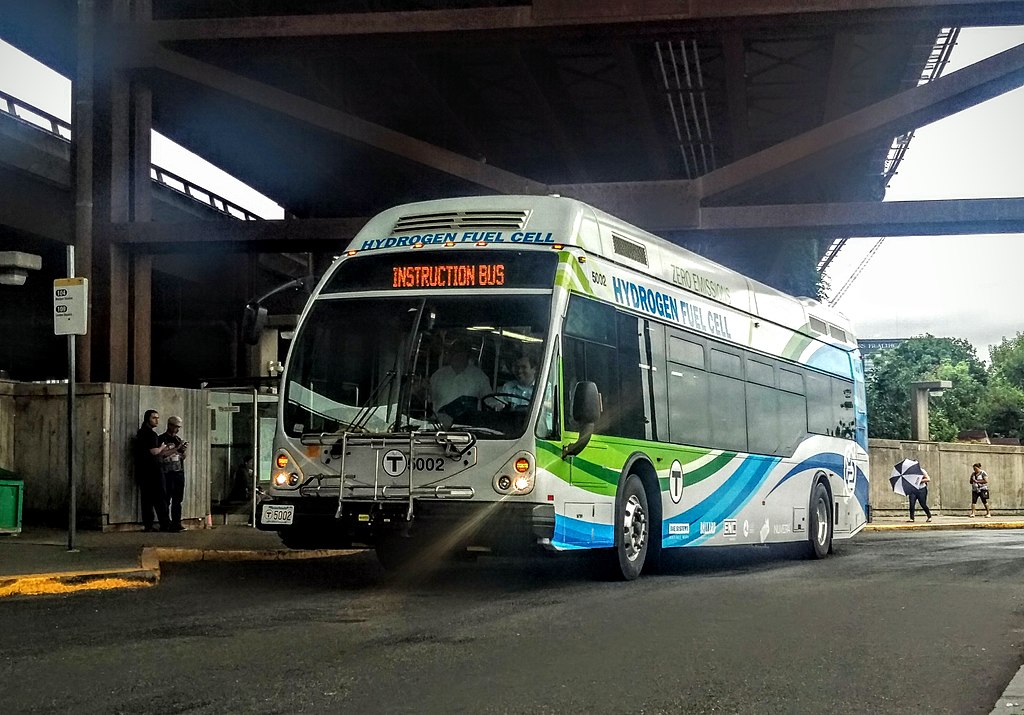
A hydrogen fuel cell bus in Sullivan Station in Boston, Massachusetts. (King TransitMA/Wikimedia Commons)

A hydrogen fuel cell bus in Sullivan Station in Boston, Massachusetts. (King TransitMA/Wikimedia Commons)
By Jorja Siemons
WASHINGTON – Clean hydrogen fuel’s versatility and flexibility makes it foundational to a clean energy transition, experts told lawmakers, including clean hydrogen enthusiast Joe Manchin, at a Senate Committee on Energy & Natural Resources hearing Thursday.
“It can provide reliable power and long-duration energy storage to enable resiliency and a renewable grid,” said Sunita Satyapal, the director of the U.S. Department of Energy’s Hydrogen and Fuel Cell Technologies Office. “Analysis shows the potential for two to four times more hydrogen demand in the 2040 timeframe.”
Hydrogen, the universe’s most abundant element, can be separated from compounds such as water using power sources like renewable energy. This process’ net energy cycle can be low carbon or high carbon depending on how hydrogen is extracted. According to Satyapal, resulting fuel can be stored in gas or liquid form and be adept at meeting larger industries’ high energy demands.
“It can reduce emissions, especially for hard-to-decarbonize sectors like heavy duty transportation,” she told senators.
Despite hydrogen’s opportunities, obstacles remain. While fuel can be derived by extracting hydrogen atoms from water using an electric current in a process called electrolysis, the electricity’s high costs make the alternative — using natural gas — an often preferable low-cost option.
This, coupled with hydrogen’s high flammability, contributed to senators’ concerns about the fuel.
“There are many logistical questions that need to be answered as to the use of this technology and how it grows,” said Sen. James Lankford (R-Okla.).
Manchin, who chairs the committee, has opposed reforms curbing the activities of the coal and natural gas industries, which remain foundational to West Virginia’s economy. His own family business profits off selling waste coal to high-emission power plants.
Nevertheless, West Virginia’s coal production has continued to decline due to decreasing demand and the COVID-19 pandemic’s economic consequences, according to data from the U.S. Energy Information Administration.
Unlike renewable energies such as solar and wind, hydrogen fuel still relies on natural gas. This is good news for Manchin — and his West Virginia constituents in the natural gas sector.
Thursday’s hearing comes after Manchin backed away from the Biden administration’s Build Back Better plan, leading to several new rounds of hand-wringing and political overtures to placate the Democrat.
But Manchin’s support for hydrogen is not singular, as other Democrats, as well as Republicans alike on the panel expressed support for the clean fuel.
“It appears that we have bipartisan agreement that hydrogen hubs are something that can point us toward a lower-carbon future,” said Sen. Bill Cassidy (R-La.).
Manchin asked Mike Graff, who is both the chairman and chief executive officer of industrial gas production company American Air Liquide Holdings, Inc., how the U.S. can accelerate hydrogen production.
“There’s got to be a clear role in a public-private partnership with the government to have smart climate policy that incentivizes the need to build the infrastructure to make this occur,” Graff said.
To accelerate progress, Brian Hlavinka, the director of New Energy Ventures for Williams Companies, emphasized pursuing all production methods through a “colorblind approach.”
Hydrogen fuel is categorized into “color” categories that describe its carbon emissions. “Green hydrogen” — the most climate-friendly option according to experts — is produced by renewable energy, whereas “blue” and “gray” hydrogen use fossil fuels and emit carbon dioxide.
Nevertheless, Sen. Martin Heinrich (D-New Mexico) later pointed out that, by around 2030, green hydrogen made from electrolysis will be cheaper overall for companies than the hydrogen made from natural gas that requires subsequent carbon capture.
Clean Air Task Force’s Jonathan Lewis pushed back. “We need a lot of clean hydrogen quickly,” he said. “Our expectation is that hydrogen made from natural gas with carbon capture sequestration is significantly cheaper than green electrolytic processes right now.”